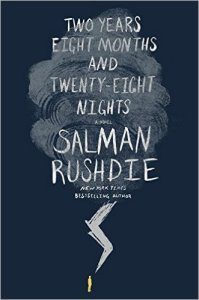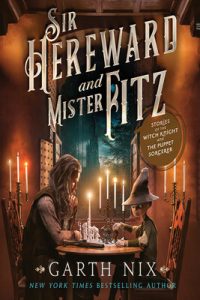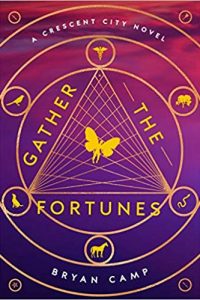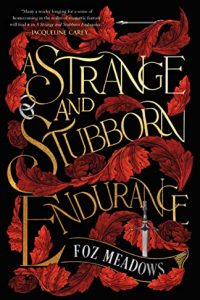Paul Di Filippo reviews Salman Rushdie
Two Years Eight Months and Twenty-Eight Nights, by Salman Rushdie (Random House 978-0-8129-9891-7, $28, 304pp, hardcover) September 2015
 For a fellow who is routinely held up as a Nobel Prize contender, unfairly denied that honor in the past, Salman Rushdie sure looks like one of us: a writer of fantastika, conversant with genre tropes, playful, irreverent, idea-besotted, as literarily fluent and accomplished as, oh, say John Crowley or Gene Wolfe or Geoff Ryman or Ian MacLeod. And Rushdie of course has forthrightly affirmed his own early and continuing love of genre fantastika. (He even provides a rollcall of his Golden Age favorites on page 227 of the book we are about to discuss.)
For a fellow who is routinely held up as a Nobel Prize contender, unfairly denied that honor in the past, Salman Rushdie sure looks like one of us: a writer of fantastika, conversant with genre tropes, playful, irreverent, idea-besotted, as literarily fluent and accomplished as, oh, say John Crowley or Gene Wolfe or Geoff Ryman or Ian MacLeod. And Rushdie of course has forthrightly affirmed his own early and continuing love of genre fantastika. (He even provides a rollcall of his Golden Age favorites on page 227 of the book we are about to discuss.)
Now, this comparison is not meant to elevate the genre folks to some mythical higher level than they currently inhabit or to delimit Rushdie to some theoretically lower plane of creativity. I merely mean to assert that Rushdie and his genre peers are more simpatico than estranged, all working with the same energies and skills and goals, and that the segregation of some writers into mainstream categories while others get deposited into genre boxes is more a marketing trick and default of publishing circumstances than any truly significant division.
Certainly Rushdie’s newest, whose initially arcane title translates simply to “1001 nights,” pointing us slyly to the book’s Arabian fairytale influence, would not have been regarded askance coming from Tor or DAW or Angry Robot or Saga, wrapped in a Michael Whelan jacket. And in fact its basic conceit—a shift in cosmic parameters unleashes some latent wild talents in a select group of folks—is a pure comic book/pulp invention, seen fairly recently for instance in Michael Straczynski’s Rising Stars series. Additionally, Rushdie’s book slots nicely into the sub-category of Middle Eastern-inspired fantasies, which range from John Barth’s Chimera (1972) and The Last Voyage of Somebody the Sailor (1991) through Matt Ruff’s The Mirage (2012) and Helene Wecker’s The Golem and the Jinni (2013).
Rushdie starts his tale with enormous storytelling assurance and bravado, using a voice and tone which draws in the reader and immediately overcomes any disinclination to suspend disbelief. (The nebulous yet evocative frame of reference for this voice, which will come into and out of the foreground, is that of our descendants some one thousand years after the twenty-first century.) We are back in the year 1195 witnessing the mating of the mortal philosopher Ibn Rushd (otherwise known as Averroës) and the female jinn, or jinnia, named Dunia. Their tumultuous relationship produces a horde of children with magical powers encoded in their genes. But the powers remain suppressed, due to the unaccommodating nature of reality, but transmitted down the generations until a certain moment in our present (or near future, given counterfactual revelations about some sociopolitical touchstones like who inhabits the White House).
A massive storm (conjuring up memories of Hurricane Sandy or Hurricane Katrina) has hit the East Coast of America. Besides causing immense physical damage, the storm has opened up “slits” in reality, allowing creatures from the jinn realm to emerge and also awakening the congenital wild talents in the Duniazát, the children of Dunia. We will follow their escapades and adventures in montage fashion.
First we see the arousal of Mr. Geronimo, a humble gardener to the rich estates of Long Island. He begins to levitate. After dramatizing this, Rushdie detours into Mr. Geronimo’s long backstory from birth, before returning to the present—a move perhaps slightly more indicative of literary fantastika than more plot-driven genre works.
Next comes a small section where Ibn Rushd and his ancient arch-rival Ghazali begin a debate from within their respective graves, in the manner of Wilder’s Our Town (1938).
Then we divert our attention to one Jimmy Kapoor, aspiring graphic novelist. (Rushdie’s prose assumes a whole different cadence and vocabulary for this section.) He is visited by his own creation, the super-dancer Natraj Hero, who emerges from a wormhole into Jimmy’s bedroom. And then Jimmy enjoys a visit from Dunia herself.
After that, Rushdie’s focus become more diffuse, as he employs a roving camera eye to swoop among a dozen or so other transformed folks, in the manner of a Wellsian narrator or maybe like some scenario from When Worlds Collide (1933)—fittingly, since that is exactly what’s happening. His writing is ironic, wry, empathetic and epigrammatic: “Like so many unbelievers, [he] was looking for paradise…” “When Alice fell down the rabbit hole it was an accident, but when she stepped through the looking glass, it was of her own free will, and a braver deed by far.” “To recount a fantasy, a story of the imaginary, is also a way of recounting a tale about the actual.” “Just as we are created anew by what we love, so we are reduced and unmade by what we hate.” The reader is buoyed up and carried along by the evident zest Rushdie is displaying in his telling.
And the story soon ramps up to even greater levels of action and import. The jinns of Peristan, loosed upon Earth, declare a frivolous, pointless, but deadly war on humanity, resulting in many surreal scenes, such as giant serpents entwined around skyscrapers and armies of possessed souls. Led by the baddest-ass genie of all, Zumurrad the Great, the spirits seem on the point of winning. But then they do something to anger Dunia, who enlists herself and some uncanny allies on the side of the humans.
Part of Dunia’s scheme is to fully engage the latent faculties of her hybrid children. The scene where she unlocks Mr. Geronimo’s powers might have come from a van Vogt novel, or Blish’s Jack of Eagles (1952) or Heinlein’s Stranger in a Strange Land (1961):
Then she put her lips to his temples, first the left one, then the right one, and whispered, “Open.” Immediately it was as if the universe itself opened and spatial dimensions whose existence he had never known about became visible and usable, as if the frontiers of the possible had been pushed outwards and much became feasible that had been unfeasible before….
He saw how easy it was to have influence over the natural world, to move objects, or change their direction, or accelerate them, or arrest their movement. If he blinked quickly three times the extraordinary communication systems of the jinn unfurled before his mind’s eye… To travel almost instantly between anywhere and anywhere he had only to clap his hands together, and to bring objects into being…a simple twitch of his nose would suffice…
After this point the book becomes, essentially, an epic of mythopoeic war like the Mahabharata—or maybe, to be more accurate, something like Zelazny’s Lord of Light (1967), the postmodern distillation of a fascination with repurposing ancient myths. Rushdie has a grand time detailing the titanic battles while still tracking the fates of all the human characters he first introduced. By the conclusion, peace is achieved at no small cost (humanity wins, as we already knew from the narrative framework) and all destinies, good and evil, are accomplished.
The manifold pleasures of this novel include Rushdie’s wild sense of humor (numerous follies of mankind come in for some acute pricking); the sensitive ethical and moral quandaries propounded and, if not resolved, then at least deeply pondered; the juicy language, both demotic and high-flown; and the unstoppable tide of action, both fantastical and mundane.
Essentially, what Rushdie has done with this book is to write his own script for the best Avengers movie that never will be filmed. Maybe Marvel might consider hiring this young cat for some scripting chores!





